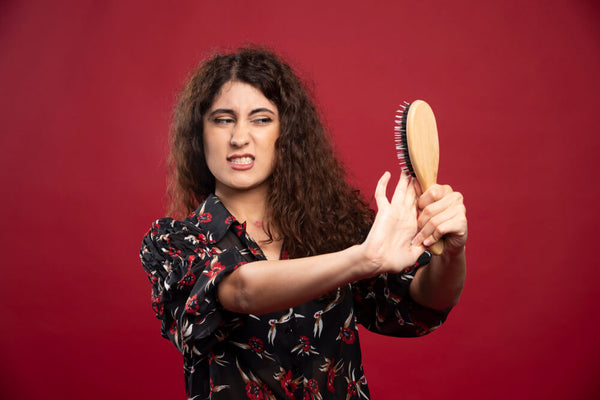You did everything right. You noticed the thinning, you made the appointment with a dermatologist, you sat through the examination. Maybe they ran some blood tests and told you "everything looks normal." Or perhaps they prescribed a topical treatment that did nothing but make your scalp dry and flaky.
You're left with the same thinning hair—and now, even more frustration. What went wrong?
The truth is, while dermatologists are essential medical doctors, their training often focuses on diagnosing disease states, not on the nuanced root causes of hair loss in melanated women. When it comes to conditions like CCCA, traction alopecia, and hormonal hair thinning, a different approach is often needed.
What Can a Dermatologist Actually Diagnose?
Let's give credit where it's due. A dermatologist is your go-to for ruling out serious medical issues. They are fantastic for:
-
Performing scalp biopsies to confirm scarring alopecia like CCCA or Lupus.
-
Diagnosing fungal or bacterial infections on the scalp.
-
Identifying autoimmune conditions that manifest in hair loss.
-
Prescribing oral medications like Finasteride or Spironolactone.
They work from a medical model: identify the disease and treat it, often with pharmaceuticals. This is crucial and valuable. But for many of us, the story doesn't end there.
Why Did My Dermatologist Miss the Root Cause of My Hair Loss?
This isn't necessarily about a bad doctor. It's about a gap in the system. Most dermatology residencies spend very little time on the specific hair and scalp conditions that disproportionately affect Black women.
A dermatologist might correctly diagnose you with "telogen effluvium" (hair shedding), but they often stop at the trigger—"it was probably stress." They don't always try to understand why your body couldn't handle that stress. They rarely investigate the nutrient deficiencies, the underlying inflammation, or the hormonal imbalances that made your hair vulnerable in the first place.
This is the difference between treating a diagnosis and healing your hair.
Dermatologist vs. Trichologist: Which One Do You Really Need?
Think of it as building a house. You need different experts for different phases.
The Dermatologist is the Inspector. They come in, make sure the structure is sound, and check for critical code violations (disease). They are essential for safety.
The Trichologist is the Architect and General Contractor. We look at the blueprints of your overall health—your nutrition, your hormones, your lifestyle—and we manage the entire, detailed process of rebuilding from the ground up.
At Nina Ross Hair Therapy, Dr. Nina Ross is both a Board-Certified Trichologist and a Functional Medicine Practitioner. We use the dermatologist's diagnosis as a starting point, not the finish line.
What Your Dermatologist Might Have Overlooked
When you come to us after seeing a dermatologist, we often find these missing pieces:
Ferritin Levels: Many doctors check "iron," but not ferritin (your stored iron). For hair growth, you need ferritin levels above 50-70 ng/mL, which most labs still flag as "normal" at a much lower number.
Subclinical Hypothyroidism: Your TSH might be in the "normal" range, but optimal for hair growth is much tighter.
Vitamin D Deficiency: Extremely common in our community and devastating for hair health.
The Cortisol-Stress-Hair Loss Connection: How chronic stress is depleting your specific nutrients.
The Cultural Component: Understanding how your hair care practices have impacted your scalp health over decades.
The Nina Ross Method: When Dermatology Meets Functional Trichology
This is where we create real change. We bridge the gap between traditional medicine and holistic healing.
We Start with Advanced Lab Work: We go far beyond standard blood tests to look at your comprehensive hormonal panel, micronutrient levels, and inflammation markers.
We Connect the Dots: How do your digestive issues, your sleep patterns, and your diet relate to the inflammation on your scalp? We find those connections.
We Create a Personal Plan: It may include nutraceuticals, any dietary changes and also some advanced treatments like PRP or Exosome Therapy to directly stimulate follicles that traditional topicals can't reach.
When Should You See a Dermatologist Versus a Trichologist?
See a dermatologist first if:
-
You have a rapidly spreading bald spot.
-
Your scalp is painful, has pus, or shows signs of infection.
-
You need an official diagnosis or a scalp biopsy.
See a trichologist like Nina Ross if:
-
Your dermatologist said "it's just stress" or "it's genetic" and sent you home.
-
You've tried prescriptions like minoxidil with no results or with irritating side effects.
-
You want to understand the why behind your hair loss and fix it from the inside out.
-
You're dealing with a complex condition like CCCA and want to stop the progression.
Book Your Evaluation Session Right Now
Your hair doesn't have to be a mystery that doctors can't solve. If you've hit a dead end with traditional dermatology, it's time for a different path. Book your $99 Hair Therapy Evaluation at Nina Ross Hair Therapy.
Let's use our expertise in functional trichology to find your missing pieces and build a plan that finally delivers the thick, healthy hair you deserve.














